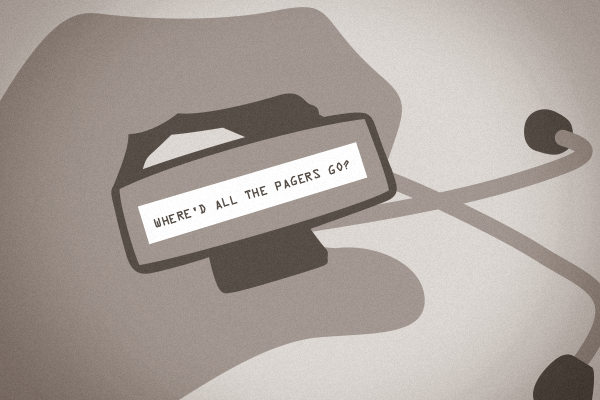In a new post on Fortune, writer Verne Kopytoff looks into the current state of pagers. At their heyday in the mid 90s, some 61 million of the devices were in use. But since then numbers have dwindled to around five or six million today, according to Ronald Gruia, an analyst with Frost & Sullivan. It’s an educated guess, though because Frost & Sullivan officially stopped tracking the pager market in 2006. That’s because of their admitted irrelevance.
The article outlines some advantages to pagers. For one, they’re small and light enough to carry in a pocket or on a belt. And they don’t require charging. All you have to do is pop in new batteries. But the downside is that pagers have no address book and no guarantee that you’ll know who contacted you (unless the sender leaves their name in the message). Consider this externality, too: according to a recent survey by the Ponemon Institute, a technology research organization, pagers and other outdated communications systems cost hospitals $8.3 billion annually in lost productivity and increased patient discharge times. The survey, based on responses from 577 healthcare professionals, found that doctors, nurses, and others in the health care field waste around 45 minutes daily because of inefficient communications systems. Additionally, hospitals take 101 minutes, on average to discharge patients, much longer than otherwise necessary, the survey found. Secure text messaging, could cut that time in half for hospitals, most of the respondents said.
So that’s the bad news. However, the article claims the researchers had financial incentive to report negative results. Commenters also chimed in extolling the virtues of pagers (one, who was stuck working in a basement said his colleagues constantly complain about getting his voicemail whenever they call his mobile).
We aren’t using pagers here at Atlas MD. But we also don’t work in the catacombs of a ginormous hospital, where phone reception disappears and you may as well be stuck in the mid 90s. So what do you think? Are pagers going anywhere? We like to say “no harm, no foul.” It’s not like the pagers are hurting anyone. Granted, patient discharge could make use of modern communication like texting. But it’s likely these long discharges are the result of poorly designed EMRs (remember the classic case of shoddy EMRs incentivized by Meaningful Use, then doubled up with paper records?). Or the fact that office staff are jumping through bureaucratic hoops trying to get insurance companies to pay for services rendered. Maybe we shouldn’t point fingers at an innocent, albeit outdated, bystander, the pager.
